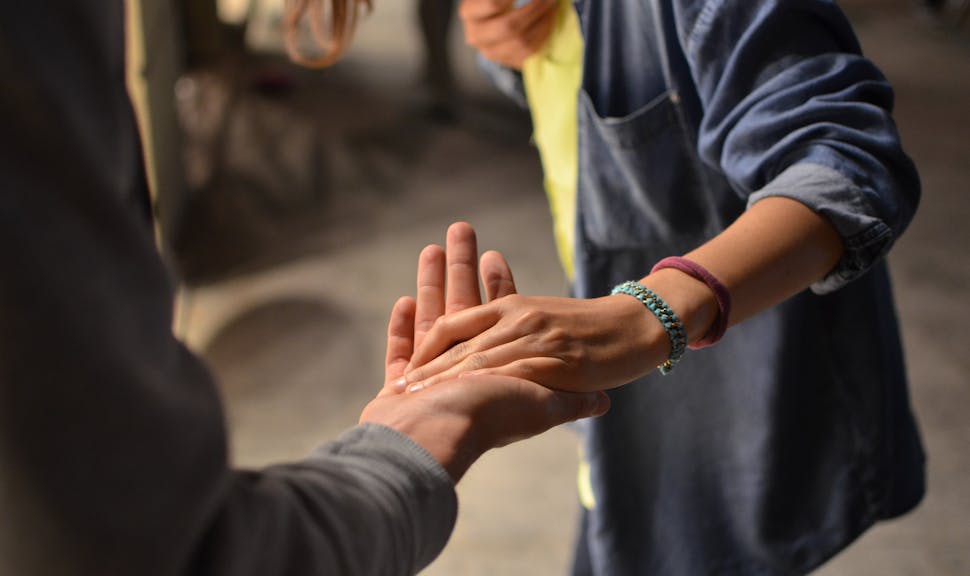

Karima SilventGlobal Head of HR at AXA
October 31, 2021
Breaking the Silence, Not Feeling Alone
Faced with difficulties, we are all the same. We are all human.
4 minutes
Life can turn upside down in a single day. We can be overwhelmed by an event, upsetting news, trauma... How do we get out of it? How do we accept those feelings? How do we cope with everyday life? How do we ask for help?
For many years, society valued strength. Admitting one's weaknesses was out of the question. Thankfully, times are changing and mindsets are evolving. As witnessed with the COVID-19 health crisis, transformations in the workplace have accelerated.
Confinement, remote work, and hybrid set-ups have blurred the boundaries between personal and professional life. Almost overnight, we've been welcomed into our colleagues' homes, we've caught a glimpse of their children behind the computer... But what did we know about the isolation, the loneliness, the suffering, the lack of contact and support?
A Demanding Double Life
Of course, everyone has their own story, beliefs, values, and lifestyle. Nevertheless, when faced with the unexpected, not feeling alone is essential to help us hold our course, the course of life. Keep your head up, don't break down, don't disappoint... But how can one keep up with the demands? How can we remain productive, creative, and driven when we are struggling with illness, when our physical health is fragile, when our mental health is on the line? How do we deal with our work day when, in private, we are the sole provider, caregiver of a sick person, companion of an elderly person?
Caregiver's Day has recently brought these realities to light: 30% of French people are caregivers, 60% of caregivers currently have a job. And, according to the non-profit Maison des aidants, 44% of employees who are caregivers for an elderly relative report finding it difficult to balance their professional and private lives.
When I worked in healthcare and retirement homes, I witnessed their struggles and despair before experiencing them myself.
Success at All Costs?
In February 2018, a few months after my nomination as AXA Group’s Director of Human Resources, I learned that my sister, just one year older than me, had terminal cancer. She lived in the north of France, and I brought her back to Paris to look after her.
That year was extremely challenging for me. On the one hand, I had the pressure of taking up a leadership position, and on the other hand, my sister was hospitalized with a serious illness.
Together with my younger sister and other family members, we set up a relay system to stay by her side, surround her with love, and handled parts of her daily life. Ten months passed between her hospitalization and her dying. This period was both physically and psychologically challenging. Beyond the support of my family, I shared with one or two people at the time, including my manager.
Speak Out to Get Help
Burnout, anxiety... I learned a lot from what I personally experienced. My meditation training started at that time. My mind was constantly racing, and the stress was so high that the only way I could cope was to find some kind of outlet, a breath of fresh air.
Having to juggle personal and professional life can feel insurmountable at certain times in life. I am convinced that talking about the pressure is an essential first step in getting support.
The events we endure, the difficulties we face, and the losses we experience affect us deeply. They drain us of energy, and cause our physical and psychological health to falter; I have experienced this.
Of course, my story is like so many others. If I talk about it, it is because I am aware of the number of people in the workplace who are going through these same difficulties, and who sometimes don’t want to or cannot share with people around them.
I believe that everyone should be able to confide in someone they trust in their private sphere, but also at work. Several AXA colleagues from different countries have already shared their experiences. But there are no single way of doing it; it's personal. People might not want to talk about their situation or share their emotions, even though I am sure that talking can help, especially in overcoming inevitable feelings of isolation.
Freeing up speech, allowing ourselves to confide in others, finding ways to protect ourselves… At AXA, specific programs dedicated to physical and mental well-being have been deployed for all employees. Confidential psychological hotlines independent from management are now available for employees in all countries. And I encourage everyone to use them. In addition to these dedicated services, managers, colleagues, and friends, we can and shall support and be attentive to each other.
Going through difficult times should not remain a secret. Experiencing hardships and not feeling at the top of your game all the time should not be a source of shame or create concern about your performance or the future of your career.
Faced with difficulties, we are all the same. We are all human.



